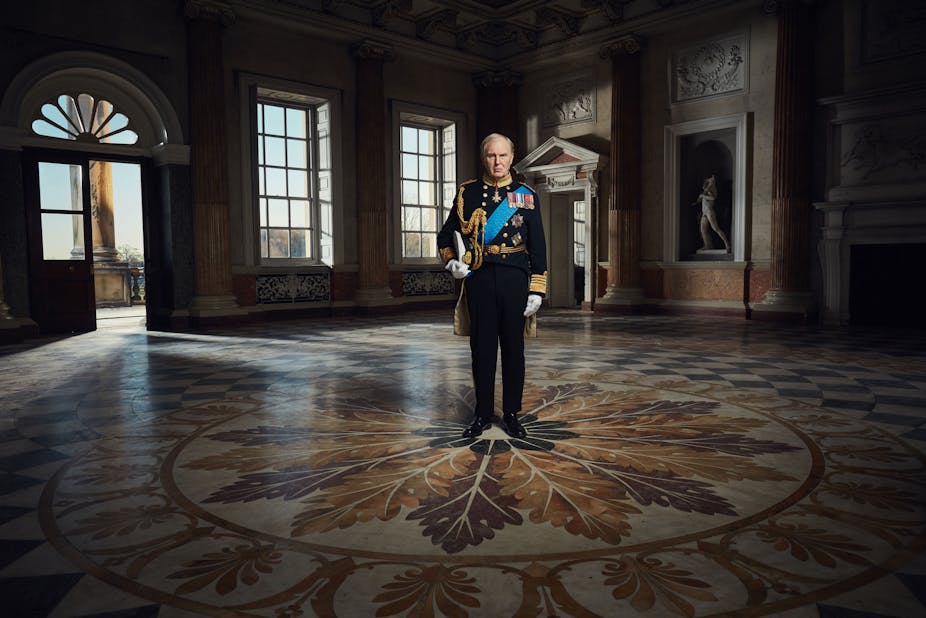The BBC is again under attack, this time for having the temerity to broadcast Mike Bartlett’s 2014 play, King Charles III. Bartlett imagined what might happen if Prince Charles ever succeeds his mother, depicting a conflict between a stubborn monarch and a government wanting to regulate the press. When Charles makes his opposition public he discovers that the people back the prime minister and is forced to abdicate. Along the way, Bartlett paints the royals in an unflatteringly disputatious light – and even has Princess Diana’s ghost make an appearance.
Given revelations about Charles’ secret attempts to meddle in government business, the play only exaggerates for dramatic effect what we know about him and the political influence the British constitution still grants leading royals. Despite that, UKIP MEP Roger Helmer called the play “an outrage against decency and privacy”, while Conservative MP Andrew Bridgen claims it “denigrates and undermines our royal family”.
It is unlikely a single play broadcast on BBC2 will do as Bridgen fears. But it’s about time the corporation did something to rectify the massive imbalance in drama about the royal family. For when they depict the lives of Britain’s monarchs, dramatists have overwhelmingly acted as if they were members of the propaganda wing of the House of Windsor.
Ever since Queen Victoria was first represented on the big screen in 1937, she and her successors have been mostly shown to be the disinterested servants of their people, motivated only by their love for them or their sense of public duty. To advance this medieval fantasy, dramatists have bent historical fact almost out of shape.
An impeccably good run
Victoria the Great (1937), for example, suggested that the repeal of the Corn Laws – which imposed restrictions and tariffs on imported grain – was due to Victoria being upset at her people’s inability to afford the price of bread. This turned the then prime minister, Robert Peel – the figure actually responsible for repeal – into Victoria’s cipher. The Mudlark (1950) has it that Victoria only ended her period of seclusion after her husband Albert’s death to support legislation from the prime minister of the time, Benjamin Disraeli, aimed at improving the lives of her poorest subjects. Later depictions continued this pattern. Such was the monarch’s desire to improve the lot of her people, Young Victoria (2009) has her stand up to Lord Melbourne, who is shown as having no interest in their welfare.
The King’s Speech (2010) showed Victoria’s great grandson George VI overcome his painful stammer, which the movie implies was a matter of vital national importance because Britons needed his wartime broadcasts to inspire them to victory during World War II. This sidelines Winston Churchill’s radio rhetoric, which did briefly perform that important function. The film compounded the error by casting Churchill as a supporter of the struggling George, a role the real Churchill never played in the 1930s. Indeed in Churchill’s battle against appeasement the king was firmly on the side of the then prime minister, Neville Chamberlain, who disastrously sought conciliation with Hitler.
George’s daughter – Elizabeth II – also benefits from sympathetic dramatic treatment, notably by Peter Morgan, who in the television plays The Deal (2003) and The Special Relationship (2010), cast Tony Blair as unprincipled and vainglorious. If scathing about politicians, Morgan’s attitude to the monarchy is very different. In the 2006 film The Queen – which won actress Helen Mirren an Oscar – he showed Elizabeth at bay after the death of Diana, assailed by a hysterical public, attacked by an unfriendly media and surrounded by political forces ambiguous about the monarchy’s survival. Elizabeth’s crime, according to Morgan, was merely that she adhered to an honourable if old-fashioned code of public service in a world gone mad.

Morgan’s 2013 play The Audience built on that portrait and in a series of vignettes in which Elizabeth meets her many prime ministers, the Queen emerges a wise and witty person whose happy life had been upended by her unwanted job as monarch, a task she nonetheless executes with admirable skill.
More recent monarchial drama, notably ITV’s Victoria and The Crown on Netflix, continue to mine these themes.
As I suggest in A State of Play, there is plenty of evidence that dramatisations of politics helps shape how audiences think of democracy. Views of the monarchy are however not just the creation of dramatists. They are also moulded by official ceremonies that situate the monarch at the heart of the nation, celebrations which are the result of a deliberate “invention of tradition” by the political elite, a process that has been ongoing since the late 19th century.

Only 17% of the British are republicans. But even the monarchist majority deserves a more balanced picture of those who have been head of state. King Charles III is an exaggerated imagining of what might happen and perhaps showing Diana returning from the grave is in questionable taste. But at least in broadcasting the play the BBC is going beyond the fantastic notion that Victoria and her successors were always the loving heart of an otherwise heartless political world, the only figures who wanted to put the people’s interests first – unlike those whom the people actually elect to do that job. For that the corporation should be thanked.

